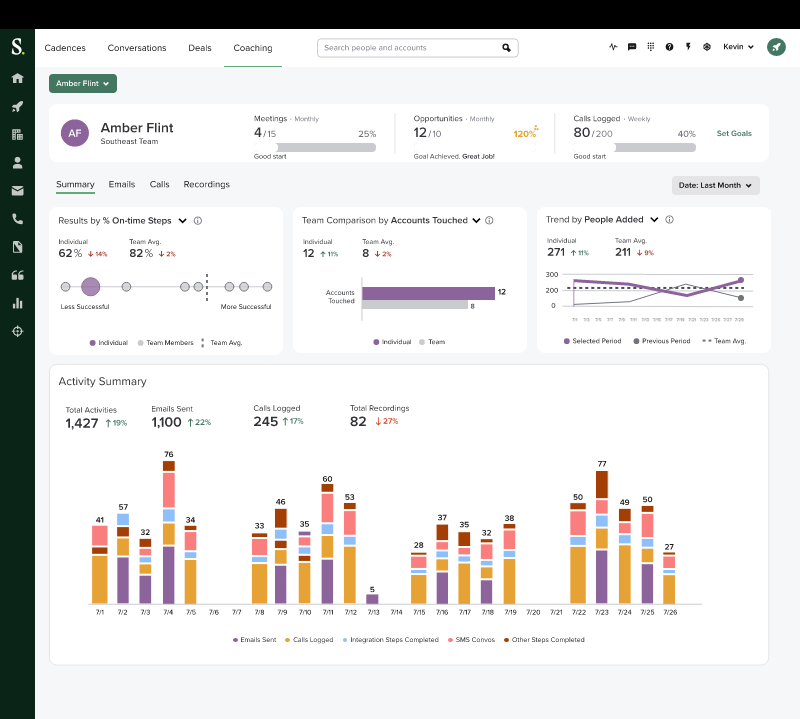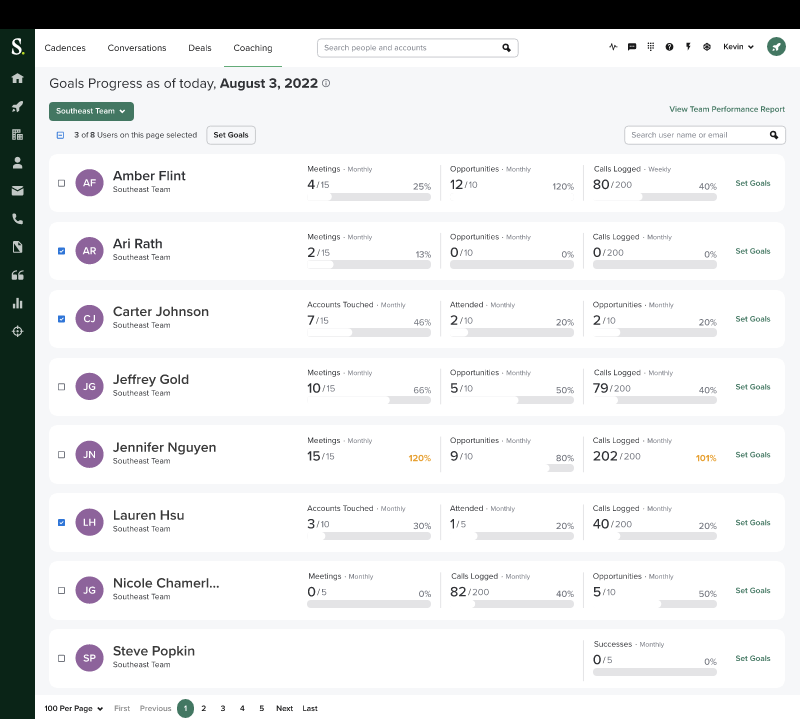1:1 Sales Coaching Should Provide Every Seller a Clear Path to Success
Updated:
Published:

We all know that we’re only as good as the people we have and how our teams perform. Done well, 1:1 sales coaching can make every seller a top performer.
But for many of the sales managers we talk with, the current state of coaching isn’t working. Managers are spending hours listening to call recordings, cross checking multiple spreadsheets, and digging through hand-written notes to prepare for 1:1s. Too often what could be a powerful, individualized conversation ends up being generic training or a discussion about how many calls were made. As a result, it’s no surprise that managers struggle to retain the best sales talent, increase win rate, and book more revenue.
60% of reps are more likely to leave their jobs when their manager is a poor coach.
(Source)
It’s Time to Modernize Your Sales Coaching
With more companies operating in a fully remote or hybrid model, sales managers can’t casually walk over and check-in with sales reps, and there’s no opportunity to ‘pop in’ with questions. Remote selling and the war for talent has fundamentally changed sales coaching.
Modern coaching places more emphasis on effective 1:1 sales coaching meetings and a manager’s ability to surface insights from engagement data and recorded conversations.
A core part of a sales coaching program is the 1:1 discussion between a rep and their manager. This is where trust is established. It is where learning happens. It is where change is adopted. It is where long term relationships are built.
It’s also the first place where managers cut corners to save time. Postponing a 1:1 can save hours of prep work. But instead of postponing, managers need a way to more quickly prepare for meaningful 1:1s. They need coachable moments surfaced for them so they can spend more time coaching.
By targeting specific skills and enforcing their use with concrete goals, sales leaders raised rep productivity by 25 percent within 18 months.
(Source)
Our sales team spent hundreds of hours with top sales managers watching them coach in real-time to fully understand the challenges they face. Using what we learned, we built workflows to deliver the best practices of world-class coaches to every user. We incorporated all the engagement data available through the Salesloft Platform to form a full picture of every seller’s efficiency, effectiveness, and volume. Then we brought it all together in an easy-to-use interface with individual performance, team performance, and progress toward pre-set goals all in one place with the ability to drill into the data.
This is Salesloft Coaching. And here’s how it lays the foundation for a dialogue between sellers and managers that builds trust and improves performance.
1. Change Your Approach to 1:1 Sales Coaching
Your biggest impact as a sales coach is improving the specific skills of your individual reps. Yet many managers spend more time finding seller activities to coach on than forming constructive feedback. So, we built Coaching to take on your busy work by suggesting calls and emails to review that you can listen to and read directly in the workflow. With visibility into how sellers are performing across channels, you can spend your time identifying key trends and quickly drill down to find important coachable moments in the sales process. Your commitment to effective coaching will help retain top performers and reduce churn.

It’s hard to see the big picture when you’re drowning in activity metrics. To keep your focus on the outcomes that matter, you need to see seller performance against their goal with the ability to quickly drill down to identify coachable moments. For example, if a rep is behind on booked meetings, Coaching helps you recognize the problem is efficiency (low percent of on-time steps) and coach accordingly. With the right data, you can continuously improve your team’s efficiency, effectiveness, and volume in prospecting and closing deals, and help them book more revenue with less effort.

3. Build a Coaching Culture
We want to make every seller a top performer. To replicate success, you need to be able to see when a rep is excelling compared with the team, and drill down to find the behavior driving their success. Is it a personalized email? A great opening line? When you use Coaching to define best practices, put them into a standard workflow, and scale across teams, you will uplevel your entire revenue organization. Plus, Coaching encourages reps to keep an eye on their peers,reach out with custom notes to get more information, and replicate success.

Modern Coaching Will Continue to Evolve
This is just the beginning. Meaningful, data-driven 1:1 conversations are the foundation of a successful coaching culture.
So, use Salesloft Coaching as a guide to build real trust with your team. Take advantage of a workflow that helps you find every insight you need to prepare, plan, deliver, and follow up on your 1:1 sales coaching sessions – all in one place.
You’re going to need that foundation when we take it to the next level. See Salesloft Coaching in action now.



























